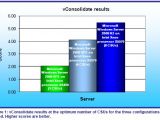It’s that time again! Microsoft traditionally doesn’t allow the benchmarking of its products as long as the software is still in development, but both the Windows 7 client and Windows Server 2008 R2 have been released to manufacturing on July 22nd, 2009. The RTM status opens up comparison scenarios, but Principled Technologies has already performed a Windows Sever 2008 R2 (Windows 7 Server) vs. Windows Server 2008 SP2 operating system measuring contest with a focus on the hypervisor technology.
The Hyper-V comparison study, involving the SP2 and R2 releases of Windows Server 2008, was commissioned to Principled technologies by both Microsoft and Intel. However, the performance comparison does not feature the RTM, Build 7600 of Windows Server 2008 R2, but has instead used a post-Release Candidate development milestone, namely Build 7229.
“Principled Technologies tested Harpertown and Nehalem servers running various Windows Server operating systems to show the benefits of processer and of operating system improvements on simulated customer workloads. Windows Server 2008 R2 delivers over 37% more capacity on these tests on the same Nehalem-based servers,” Edie van den Berge, Microsoft partner technology specialist, revealed.
The study was designed to measure the level of Hyper-V R2 virtualization performance improvements using vConsolidate on a combination of Windows Server platforms and Intel CPUs. In this context, the comparison involved Windows Server 2008 Enterprise Edition SP2 and R2 on Intel Xeon E5450 and X5570.
Here are the key findings of the Windows Server 2008 R2 vs. Windows Server 2008 SP2 performance comparison: “The Intel Xeon processor X5570-based server with the optimum number of CSUs delivered 37.1% more vConsolidate performance than when running Microsoft Windows Server 2008 Enterprise Edition R2 than when running Microsoft Windows Server 2008 Enterprise Edition SP2. Windows Server 2008 Enterprise Edition SP2 running on the Intel Xeon processor X5570-based server with the optimum number of CSUs delivered 98.7% more vConsolidate performance than when running the Intel Xeon processor E5450-based server with the optimum number of CSUs.”

 14 DAY TRIAL //
14 DAY TRIAL // 
